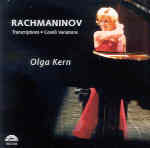Pianistically speaking Olga Kern boasts solid-steel fingers and a powerful sonority to match, yet her efforts to make her interpretations interesting don’t ring true. In the Kreisler Liebeslied and Liebesfreud, for example, she imposes lurching gearshifts that impede the music’s melodic flow, yet she plows through passages where one might naturally wish to make a ritard to bring out a countermelody or harmonic felicity. Her little caesuras in Schubert’s Wohin sound worked out and ultimately predictable rather than spontaneous. The Scherzo from Mendelssohn’s Midsummer Night’s Dream and Rimsky-Korsakov’s Flight of the Bumblebee are more effective when played with a lighter, suppler touch than Kern offers.
The Corelli Variations emerge as a series of short pieces rather than a unified whole due to Kern’s pausing between movements that ordinarily are linked, and the louder she plays the bleaker her tone becomes. She tosses off her note-perfect, amazingly proficient Liszt Second Rhapsody with the soul of a mannequin and nothing of the rhetoric, imagination, and humor we hear from Marc-André Hamelin’s even greater keyboard mastery. On the other hand, Kern’s deft phrase shapings throughout the three-movement suite derived from Bach’s E major Partita thrill and delight. For the transcriptions, I decidedly prefer Friedrich Höricke’s suaver, more cultivated pianism and musicianship (MDG), and Vladimir Ashkenazy’s more cumulatively satisfying approach to the Corelli Variations.
































